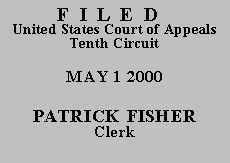

| KENNETH RAY ATKINS, |
|
Before BRORBY, KELLY, and
MURPHY, Circuit Judges.
After examining the briefs and appellate record, this panel has determined
unanimously that oral argument would not materially assist the determination of
this appeal. See Fed. R. App. P. 34(a)(2); 10th Cir. R. 34.1(G). The case is
therefore ordered submitted without oral argument.
Appellant Kenneth Ray Atkins, a state inmate appearing pro se, appeals the district court's decision dismissing as untimely his habeas corpus petition filed pursuant to 28 U.S.C. § 2254, and denying his request for a certificate of appealability. We deny Mr. Atkins' request for a certificate of appealability and dismiss his appeal.
The district court dismissed Mr. Atkins' petition as untimely. In so doing, the district court applied the applicable statutes and carefully calculated the deadline for filing Mr. Atkins' petition. The district court first determined Mr. Atkins' conviction became final on July 31, 1996, and the one-year statute of limitation applied under 28 U.S.C. § 2244(d) extended the filing period for Mr. Atkins' petition to July 30, 1997. The district court then determined Mr. Atkins' first state post-conviction application tolled the one-year limitation period under § 2244(d)(2) for forty-nine days from April 24, 1997 until June 12, 1997, thereby extending his one-year limitation period from July 31, 1996 to September 17, 1997.
The district court next rejected Mr. Atkins' request to equitably toll the limitation period for another ten months and six days from June 12, 1997, when the state court issued his first post-conviction decision, to April 17, 1998, when Mr. Atkins allegedly learned of the state court's decision. In rejecting this argument, the district court ascertained Mr. Atkins: 1) provided no documentation showing his counsel abandoned Mr. Atkins' case in allegedly failing to advise him of the state court's decision; and 2) failed to diligently pursue his federal habeas claims. The district court further reasoned that even if the limitation period was extended until the time Mr. Atkins knew about the denial of his state petition, Mr. Atkins still did not timely file his petition. In making this determination, the district court added the ten-month and six-day period in which Mr. Atkins claimed he did not know of the state decision, to the September 17, 1998 deadline, arriving at a new, hypothetical deadline of July 23, 1998 for filing his petition. However, the court noted Mr. Atkins did not actually file his habeas petition until April 19, 1999 well beyond July 23, 1998.
The district court also rejected Mr. Atkins' argument his second state habeas post-conviction petition,(1)
filed on October 21, 1998, tolled the deadline. The district court found Mr. Atkins' second state petition could not toll the limitation period as he filed it even after the hypothetically extended deadline of July 23, 1998. Finally, the district court held Mr. Atkins' alleged three-month delay by his attorneys in filing his direct appeal had no significant effect on the date his conviction became final.(2)
On appeal, Mr. Atkins raises the same issues addressed by the district court concerning the equitable tolling of the limitation period for filing his petition. Specifically, Mr. Atkins suggests tolling the limitation period by seventeen months for delays which occurred in filing his direct state appeal and in discovering the state appellate court's ruling on his first state habeas petition.
We review the legal basis for the district court's dismissal of Mr. Atkins' § 2254 petition de novo. See Jackson v. Shanks, 143 F.3d 1313, 1317 (10th Cir.), cert. denied, 525 U.S. 950 (1998). In applying this standard, and after a careful review of the record, we agree with the district court's thorough and well-explained assessment that Mr. Atkins untimely filed his § 2254 petition. Therefore, we decline to duplicate the same analysis here.
Under circumstances presented, Mr. Atkins fails to make a substantial showing of the denial of a constitutional right as required by 28 U.S.C. § 2253(c)(2). Thus, for substantially the same reasons set forth in the district court's November 4, 1999 Order, we deny Mr. Atkins' application for a certificate of appealability, and DISMISS his appeal.
Entered by the Court:
WADE BRORBY
United States Circuit Judge
*. This order and judgment is not binding precedent except under the doctrines of law of the case, res judicata and collateral estoppel. The court generally disfavors the citation of orders and judgments; nevertheless, an order and judgment may be cited under the terms and conditions of 10th Cir. R. 36.3.
1. This petition raised the same issues raised in the first state post-conviction petition.
2. In requesting equitable tolling of the limitation period, Mr. Atkins relied on a letter from his wife to the Oklahoma Bar Association. In the letter, his wife alleges the attorneys who filed his direct state appeal acted ineffectively, in part by delaying the filing of Mr. Atkins' direct appeal; failing to file a State post-conviction appeal instead of a direct appeal, and neglecting for three months to advise Mr. Atkins of the state appellate court's decision on direct appeal. As the district court noted, this alleged three-month delay had no significant effect on the date his conviction became final. We further note that despite Mr. Atkins' wife's perceived three-month delay, no prejudice occurred as Mr. Atkins' attorneys appear to have timely filed his direct appeal, and Mr. Atkins timely filed a state post-conviction petition, which tolled the one-year limitation period for filing his federal petition for forty-nine days.